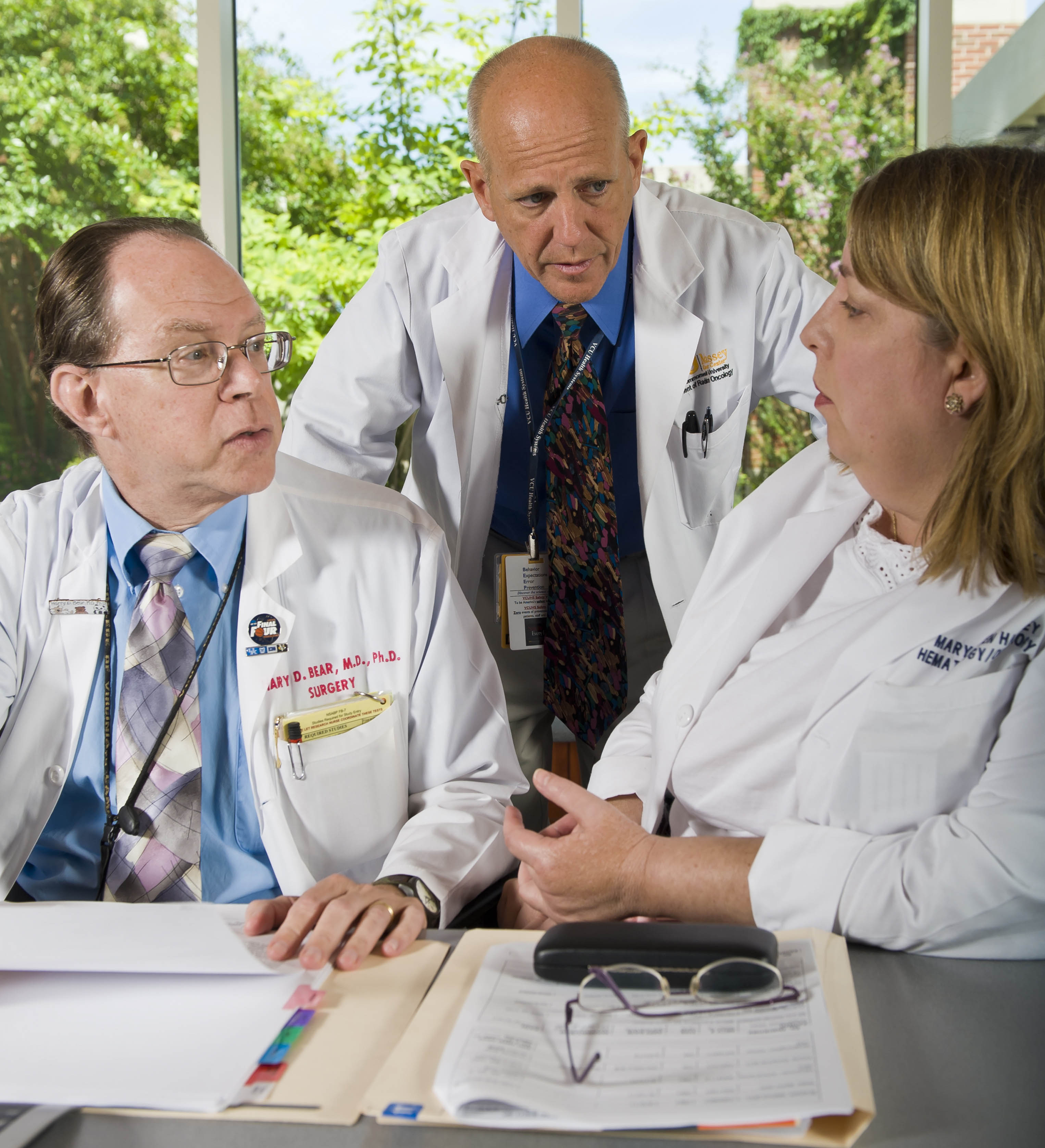Latest News
Research & Innovation, Clinical Care
Massey clinical trial tests experimental immunotherapy in breast cancer patients before chemotherapy and surgery
Nov 12, 2021

A phase 2 clinical trial at VCU Massey Cancer Center is testing the benefits of adding an experimental immunotherapy combination prior to standard chemotherapy and surgery for breast cancer patients. The trial was developed by Massey and is based on laboratory research led by surgical oncologist Harry Bear, M.D., Ph.D., interim associate director for clinical research and member of the Developmental Therapeutics research program at Massey.
The study, which opened in January 2017, is recruiting patients with locally advanced, HER2-negative breast cancer, for whom neoadjuvant chemotherapy is being recommended as standard treatment. Patients with locally advanced triple-negative breast cancer as well as patients with hormone receptor positive HER2-negative cancers are eligible. So far, 34 patients have been treated on this trial and 12 more are needed to complete enrollment.
Immunotherapy, which is treatment that activates the body’s immune system to target and destroy cancer cells, has proven to be effective against many forms of cancer. Because cancer cells are mutated versions of healthy cells, many are able to be recognized and attacked by the immune system. But many cancers have found ways to evade immune attack. Previous clinical trials have shown that breast cancers with evidence of a brisk immune response in the tumor also respond better to neoadjuvant chemotherapy. Neoadjuvant therapies are therapies given to shrink tumors before surgery. This treatment approach gives patients a greater chance of having a complete response to therapy, meaning that there is no detectable cancer at the time of surgery. Recent studies have also found that combining immune activating drugs with chemotherapy may increase the complete response rate.
Laboratory tests conducted by Bear and others have shown that the addition of decitabine increases the efficacy of immune therapy in mouse models of breast cancer.
Patients receiving pre-operative chemotherapy who demonstrate a complete response have the highest cure rates, and this study seeks to increase a patient’s chance for a complete response by using immunotherapy to improve the immune system’s reaction to breast cancer,” said Bear, who is also a professor in the Department of Surgery at the VCU School of Medicine.
Trial participants receive a month-long course of immunotherapy prior to starting chemotherapy using an experimental combination of two drugs. First, patients undergo a needle biopsy of their breast tumor, then receive decitabine for four days followed by two doses of pembrolizumab given two weeks apart. A second needle biopsy is done after the last dose of pembrolizumab. The trial is assessing whether decitabine may increase the amount of tumor antigen targeted by a patient’s immune response and decrease immune suppression by other white blood cells. Pembrolizumab (Keytruda) blocks suppression of T lymphocytes by the cancer and improves the specific ability of lymphocytes to seek out and kill tumor cells. The two biopsy samples will allow investigators to see if the experimental combination leads to an enhanced immune response to the cancer.
Decitabine has previously been approved by the U.S. Food & Drug Administration (FDA) for the treatment of cancers in the blood and bone marrow. Pembrolizumab received FDA approval for the treatment of advanced melanoma, certain forms of advanced lung cancer and other cancers, and it was recently approved, in combination with pre-surgical chemotherapy and continuing after surgery, for triple negative breast cancers. The combination of these two drugs has not yet been approved by the FDA for treating breast cancer. For patients with triple-negative breast cancer, patients may opt to receive that treatment as part of the trial in addition to the immune therapy given before chemotherapy.
After being treated with immunotherapy, trial participants then undergo one of two standard treatment regimens for HER2-negative breast cancers, which includes neoadjuvant chemotherapy for about five months, followed by surgery, if possible.
As of October 2021, there have been 34 participants treated, and the initial safety and toxicity analyses on the first 11 patients were satisfied. The trial has a maximum of 50 patients and an expected duration of three years.
Participants will be followed by the study team for approximately one year following surgery. As part of the trial, participants will not be charged for pembrolizumab, decitabine, costs related to needle biopsies or any blood samples used for research purposes. The trial is currently available at Massey and Community Memorial Hospital in South Hill as well as two other NCI-designated Cancer Centers (University of Virginia and Ohio State University).
Anyone with further questions or an interest in participating in the trial (MCC-15-11083) can contact the Early Phase Development team (EPD) at masseyepd@vcu.edu and 804-628-5006, or Harry Bear, M.D., Ph.D., at 804-828-9325 and harry.bear@vcuhealth.org.
View this news report from WTVR CBS 6 about the trial: https://www.wtvr.com/2018/06/06/pembrolizumab-and-decitabine-drug-combo-trial-vcu-massey-cancer-center/
More information about clinical trials available at Massey can be found on Massey’s website.
Written by: Blake Belden
Related News
Clinical Care, Patient Stories
How a friend’s leukemia inspired a career in oncology nursingDec 16, 2025
Clinical Care, Prevention
VCU Massey now offers new technology for early detection of lymphedemaDec 8, 2025
Clinical Care, Patient Stories
Breast cancer survivor heals her heart, leans into advocacy for othersDec 1, 2025

Get access to new, innovative care
Treatments in clinical trials may be more effective or have fewer side effects than the treatments that are currently available. With more than 200 studies for multiple types of cancers and cancer prevention, Massey supports a wide array of clinical trials.

Find a provider
Massey supports hundreds of top cancer specialists serving the needs of our patients. Massey’s medical team provides a wealth of expertise in cancer diagnosis, treatment, prevention and symptom management.
